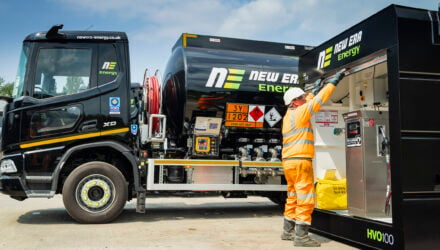
Sue Branston, Country Head of Fleet Logistics UK and Ireland
Tensions in the Persian Gulf and the trade war between the US and China have led to volatility in world oil prices, with political instability and a fall in the value of the pound against the dollar increasing the likelihood of further uncertainty throughout the rest of the year.
Now is a good time for fleets to review pricing options in the fuel market, says Fleet Logistics UK and Ireland.
Fuel prices are extremely volatile at the moment with unrest between the US and Iran and Trump’s threats to escalate the trade war with China, combined with uncertainty over Brexit, creating unsettled conditions in world oil markets. At the same time, the pound has fallen against the dollar to a two year low amid fears of a no-deal Brexit.
“We are in a volatile marketplace with global unrest and Brexit both impacting on the fleet supply chain. That’s why now is a crucial time to review options in the fuel market and control pricing in order to manage total cost of ownership,” says Sue Branston, Country Head of Fleet Logistics UK and Ireland.
Fuel spend can be hugely affected by market volatility and Branston said that fleets needed to make sure that strategic decisions made today would be the right choice for the future of their business from a cost, driver and environmental perspective.
“For any business, the diverse range of challenges involved in operating a fleet is often unique to that business, and this diversity extends to fuel policy and purchasing methods. As it’s the second biggest cost for fleets, reviewing expenditure on a regular basis, with the help of specialists to leverage knowledge within this area, is key to controlling fuel spend,” she said.
Fleet Logistics had found businesses often did not know the true cost of their fuel tariffs and many still paid pump prices, said Branston.
“Retail margins have been higher than normal this year and commodity price impacting more than currency fluctuations. Protecting the true price per litre paid, in addition to maximising consumption through improved driver behaviour, considering journey necessity, car sharing and route planning, is key in controlling fleet spend.
“There have been some nasty surprises for certain fleet operators when results of the analysis of the last 6-12 months of fuel spend have been presented to them and we compared actual costs against the best available in the marketplace and highlighted potential savings.
“One client we recently reviewed had thought they were on a good fuel tariff, but we were able to demonstrate achievable savings of £120,000 in year one. We are currently reporting on delivered savings which are actually 6% ahead of this initial forecast, “said Branston.
Branston explained that key to making fuel savings was understanding the pricing mechanisms and options available in the marketplace, especially those that were not well known, and working with an expert partner.
For fleets with fixed term contracts and or in the process of tendering for them, typically relevant to large commercial fleets, different options, such as hedging or capping, could provide certainty over fuel spend which would help when projecting costs over a fixed term.
“Hedging is a contractual tool that large fuel consuming fleets can use to reduce their exposure to volatile and potentially rising fuel cost.
“If, for example, the base price is set at 37 pence per litre, this equates to roughly £1.20 per litre once duty, margins and VAT are included. The fleet operator can then opt to hedge up to 50% of their future spend, although it depends on a business’ appetite for risk as to the percentage they would want to consider.
“Over the last six months, hedging has brought average savings of around 10p per litre. The fuel contract is managed on the client’s behalf for a set period of 12-36 months typically,” she said.
“Capping is like an insurance policy in which you cap the price for a fixed period, typically 12-36 months, when prices are at a particular point. If prices rise, you don’t pay more than your cap price based on the number of litres of fuel you use, and this protects payments during the period.
“These methods can be typically geared to those fleets with fuel consumption of around a million litres plus and smaller fleets should review their fuel prices too, and ensure they are aware of any charges over and above the price of fuel, including card fees, transaction fees and network fees, as there are often savings to be made in these areas,” she said.
Sue Branston added: “Fuel procurement is complex with many pitfalls, therefore working with a good, reliable, and neutral, partner is key. Our advice to fleets is to select a supplier that offers regular fuel reviews so you can keep ahead of the market and not have any surprises.
“Choose a well-established supplier with good credentials and one that understands the market well and the pricing options available. Many only give limited solutions that steer you towards the products or pricing mechanisms that make them the most profit.
“Fleet Logistics UK works with a number of specialist suppliers to provide corporate clients with solutions to save money, without impacting on coverage or the driver, and we are fully confident in their ability to select the best deals available” added Branston.






